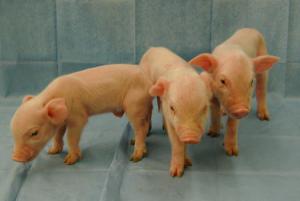Aug. 10 (UPI) — There is a shortage of available organs for all the patients waiting for organ transplants in the United States, but researchers at Harvard University say using organs from animal sources could help close that gap.
Researchers at Harvard University report in a new study that they have used the CRISPR-Cas9 gene-editing technique to enable pig-to-human organ transplantation without disease transfer, which could help lessen the number of patients who do not receive an organ transplant because of shortages.
While there were 33,600 organ transplants in 2016, the 116,800 patients on organ transplant lists may not have to wait much longer.
The research, published today in Science, showed that some of the problems with xenotransplantation, the process of transplanting organs or tissue between different species, could be overcome with gene-editing techniques.
A main concern with pig-to-human organ transplantation is not only immunological compatibility, but also the risk of cross-species transmission of porcine endogenous retroviruses, or PERVs.
PERVs have been shown to infect human cells and previous research has shown the horizontal transfer of PERVs among human cells.
To overcome this, researchers used the CRISPR-Cas9 gene-editing technique to inactivate all the PERVs in a porcine primary cell line and generated PERV-inactivated pigs through somatic cell nuclear transfer.
Dr. David Klassen told The New York Times that if pig organs were safe and effective to transplant into humans “they could be a real game changer.”
Although pig heart valves are routinely transplanted into heart patients, xenotransplantation still faces some religious and ethical obstacles. While most major religious groups say pig organs are acceptable in the case of lifesaving transplantation, one example that could be a problem for Jewish and Muslim patients is accepting a kidney transplant, because dialysis is a viable alternative.

COMMENTS
Please let us know if you're having issues with commenting.